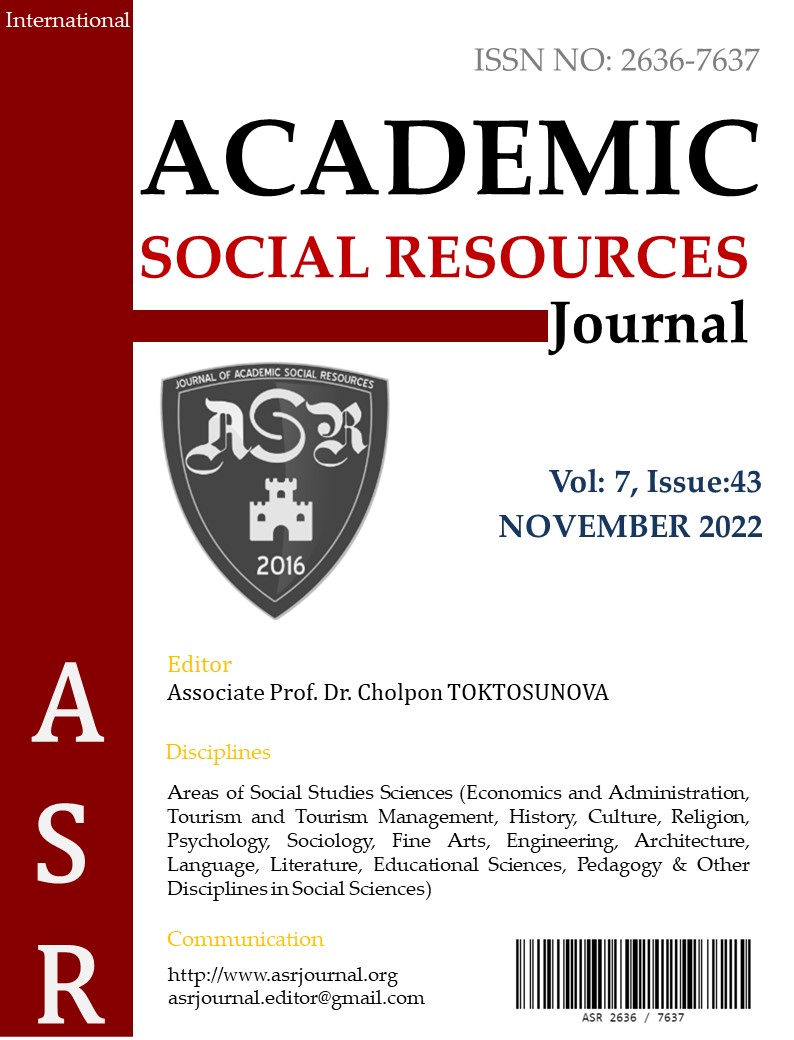Author :
Abstract
Keywords
Abstract
This study focused on revealing the relationships and interactions between workplace gossip and employee cynicism. While workplace gossip is defined as informal conversations of at least two people about a third person who is not present, employee cynicism is; It refers to the negative attitude of employees towards their own organizations. Since both phenomena are thought to be effective on the performance of employees and therefore organizations, there is a need to conduct such a scientific research.
Our main purpose here is to reveal the role of the perception of gossip in the workplace on employee cynicism. For this purpose, a survey was conducted on a total of 324 academic and administrative personnel working in Erzurum Atatürk University Health Research and Application Center. As a result of the analyzes made on the data obtained from the participants, It was concluded that gossiping in the workplace was perceived negatively by the employees and this negative perception increased the cynicism levels of the employees.
Keywords
- 1. Aboramadan, M., Turkmenoglu, M. A., Dahleez, K. A., & Cicek, B. (2020). “Narcissistic Leadership and Behavioral Cynicism in The Hotel Industry: The Role of Employee Silence and Negative Workplace Gossiping”. International Journal of Contemporary Hospitality Management, 33(2): 428-447.
- 2. Akduru, H. E., & Semerciöz, F. (2017). “Kamu Kurumlarında Örgütsel Dedikodu ve İşyeri Yalnızlığına Dair Bir Araştırma”. Uluslararası Yönetim İktisat ve İşletme Dergisi, 13(13): 106-119.
- 3. Brandes, P., Dharwadkar, R., & Dean, J. W. (1999). “Does Organizational Cynicism Matter? Employee and Supervisor Perspectives on Work Outcomes”, Paper Presented at the 36th Annual Meeting of the Eastern Academy of Management, Philadelphia PA., 1-34.
- 4. Çalıkuşu, E., Öz, M., Göral, B. B., Bozoğlu, A., & Ateş, İ., (2013). “İnformal İletişimin (Dedikodu-Söylenti) Örgüt İçi Rolü: Bir Yükseköğretim Kurumunda Yapılan Çalışma”, ICQH, Proceedings Book, Sakarya.
- 5. Dean Jr, J.W., Brandes, P., & Dharwadkar, R. (1998). “Organizational Cynicism”. The Academy of Management Review, 23(2): 341-352.
- 6. Dicle, Ü. (1974). Bir Yönetim Aracı Olarak Örgütsel Haberleşme, Milli Prodüktivite Merkezi Yayınları, Ankara.
- 7. Doaei, H. A., Eslami, G., & Gholami, M. (2021). “Investigating the Impact of Organizational Rumor and Gossip on Employees’ Job attitudes and Performance through Organizational Cynicism in the Public Sector”. Transformation Management Journal, 13(1): 55-84.
- 8. Guirdham, M. (1995). Interpersonel Skills at Work, Prentice Hall, New Jersey, USA.
- 9. Gürbüz, S. (2019). Örgütsel dedikodu ile İşyeri Yalnızlığı Arasındaki İlişki, Yüksek Lisans Tezi, Harran Üniversitesi, Sosyal Bilimler Enstitüsü, Şanlıurfa.
- 10. Han, B., & Dağlı, A. (2018). “Organizational Gossip Scale: Validity and Reliability Study”. Electronic Turkish Studies, 13(27): 829-846.
- 12. Kieffer, C. C. (2013). “Rumors and Gossip as Forms of Bullying: Sticks and Stones?”. Psychoanalytic Inquiry, 33(2): 90-104.
- 13. Kuo, C. C., Chang, K., Kuo, T. K., & Chen, S. (2020). “Workplace Gossip and Employee Cynicism: The Moderating Role of Dispositional Envy”. Chinese Journal of Psychology, 62(4): 537-552.
- 14. Kuo, C. C., Chang, K., Quinton, S., Lu, C.Y., & Lee, I.. (2015). “Gossip in The Workplace and The Implications for HR Management: A Study of Gossip and Its Relationship to Employee Cynicism”. The International Journal of Human Resource Management, 26(18): 2288-2307.
- 15. Kuo, C. C., Lu, C. Y., & Kuo, T. K. (2013). The impact of workplace gossip on organizational cynicism: Insights from the employment relationship perspective, In International Conference on Cross-Cultural Design (pp. 44-50), Springer, Berlin, Heidelberg.
- 16. Michelson, G., Iterson, A., & Waddington, K. (2010). “Gossip in Organizations: Contexts, Consequences, and Controversies”. Group & Organization Management, 35(4): 371-390.
- 17. Noon, M., & Delbridge, R. (1993). “News from Behind My Hand: Gossip in Organizations”. Organization studies, 14(1): 23-36.
- 18. Özler, D. E., Atalay, C. G., & Meltem, D. Ş. (2010). “Örgütlerde Sinizm Güvensizlikle Mi Bulaşır?”. Organizasyon ve Yönetim Bilimleri Dergisi, 2(2): 47-57.
- 19. Sarı B. (2019). Örgütsel Sessizliğin İnformal İletişime Etkisi, Yüksek Lisans Tezi. Sakarya Üniversitesi, İşletme Enstitüsü, Sakarya.
- 20. Sevda, P. (2021). Okullarda Örgütsel Dedikodu ile Örgütsel Sinizm Arasındaki İlişki, Yüksek Lisans Tezi. Siirt Üniversitesi, Sosyal Bilimler Enstitüsü, Siirt.
- 21. Solmaz. B. (2006). “Söylenti ve Dedikodu Yönetimi”. Selçuk Üniversitesi Sosyal Bilimler Dergisi, 16: 563-575.
- 22. Şahan, S. (2017). Spor Genel Müdürlüğü ve Bağımsız Spor Federasyonlarında Çalışan Personelin Algıladığı Yönetim Tarzlarının İnformal İletişim Kanallarına Etkisi, Yüksek Lisans Tezi. Selçuk Üniversitesi Sağlık Bilimleri Enstitüsü, Konya.
- 23. Tabachnick, B. G., & Fidell, L. S. (2013). Using Multivariate Statistics (6th ed.), Allyn and Bacon, Boston.





